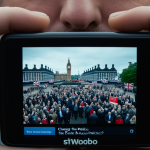Dominant Themes in the UK News Cycle
The UK news cycle consistently spotlights a set of prioritized topics that shape media coverage across outlets. Politics remains at the forefront, with intense focus on government activities, policy developments, and election dynamics. Alongside politics, the economy frequently dominates headlines, as fluctuations in markets, employment rates, and cost-of-living indices deeply impact the public. Social issues—ranging from healthcare challenges to educational reforms and environmental concerns—also garner significant attention, reflecting ongoing societal debates.
Recent editorial analyses reveal that UK news media strategically balance these themes to maintain relevance and respond to public interest. Studies show a clear pattern: political and economic subjects often receive top billing during key national events, while social issues surface continually as part of broader human-interest narratives.
Also read : How Will the Recent Changes in UK Politics Impact Everyday Citizens?
For instance, headlines such as “Government Unveils New Economic Stimulus Package” or “NHS Faces Staffing Crisis Amid Rising Demand” illustrate the priority placed on economic stability and health social concerns. Meanwhile, coverage of cultural and entertainment topics usually occupies complementary space but retains robust public engagement, signaling a diverse media coverage framework attuned to multiple audience segments.
In sum, the UK news outlets curate a dynamic mix of political, economic, and social themes, ensuring that their coverage aligns with prevailing public priorities and maintains a comprehensive portrayal of national life.
Also to see : What are the trends in UK media consumption among young people?
Editorial Decision-Making and Reader Engagement
Editorial teams in the UK carefully shape their editorial priorities to align with evolving reader interests. Decision-making often hinges on detailed audience analytics, which help determine which stories will resonate most with the diverse UK readership. By analyzing data such as page views, social media interactions, and time spent on articles, editors adapt news agendas to better suit public preferences.
Public opinion plays a crucial role in this process. Trends and emerging issues frequently influence editorial choices, ensuring that the editorial priorities reflect current societal concerns. For example, a surge in discussions about healthcare reform or economic uncertainty will prompt newsrooms to elevate those topics within their media coverage.
Reader engagement metrics, including shares and comments, offer real-time feedback that guides ongoing content refinement. This interactive loop strengthens the connection between news outlets and their audiences, making coverage more relevant and responsive. Leading UK newspapers and broadcasters often adopt this data-driven strategy, resulting in a dynamic news flow aligned with public sentiment and interest.
Influence of Politics and National Events
Political coverage is a cornerstone of the UK news cycle, intensifying markedly during periods of government changes, elections, or major policy debates. National events such as the Brexit negotiations, General Elections, and crises like public health emergencies consistently reshape media priorities. These occurrences prompt news outlets to shift focus toward detailed political reporting, emphasizing analysis and implications for governance and society.
Studies indicate that during significant national events, political topics overshadow other areas in terms of both volume and prominence, often occupying front-page space and leading broadcast segments. This prioritization reflects public demand for timely and thorough information about unfolding current affairs that directly affect daily life and national direction.
For example, headlines during a general election might read “Prime Minister Outlines New Policy Vision” or “Opposition Leader Calls for Unity Amid Political Turmoil,” illustrating a strong editorial emphasis on political coverage. Such examples underscore how national events drive the agenda-setting role of news organizations, adapting their media coverage to inform and engage the UK readership on pivotal developments.
In contrast, non-political content typically receives comparatively less coverage during these times but remains present to maintain a balanced news diet. This dynamic highlights the news cycle’s responsiveness to public interest, demonstrating how current affairs and political developments dominate perception and media resources when national stakes are high.
Economic and Social Issues in News Coverage
The UK economy consistently ranks among the most important prioritized topics within the UK news cycle. Coverage often centers on economic indicators such as inflation rates, employment figures, and business sector performance. These factors directly influence the public’s daily experience, making economic news a critical component of overall media coverage. For instance, headlines like “Inflation Hits Five-Year High, Squeezing Household Budgets” or “Unemployment Rates Fall Amid Economic Recovery” exemplify the emphasis placed on these developments.
Alongside the economy, social issues maintain a strong presence in news agendas. Public health, education reform, housing affordability, and environmental challenges are regularly discussed, reflecting ongoing societal concerns. These subjects shape public discourse by highlighting both problems and potential policy solutions. Examples such as “NHS Faces Staffing Shortages Amid Winter Pressures” or “Climate Change Policies Spark Debate Across Communities” illustrate how social topics permeate news outlets’ media coverage.
Recent editorial analyses demonstrate that newsrooms often integrate economic and social subjects to provide a comprehensive view of the nation’s welfare. This integration acknowledges the interconnectedness of financial conditions and social wellbeing, making these prioritized topics essential in aligning with the UK readership’s concerns. By maintaining steady attention to these themes, the news cycle captures key aspects of public life, ensuring that economic realities and social challenges receive appropriate coverage alongside political developments.
Celebrity, Entertainment, and Lifestyle Priorities
Entertainment news and celebrity coverage hold a notable place in the UK news cycle, complementing the focus on political, economic, and social issues. While these prioritized topics may not dominate front-page headlines, they play a crucial role in engaging a broad segment of the UK readership. Celebrity news often provides a lighter, more accessible dimension that balances the intensity of hard news, contributing to a more diverse media coverage landscape.
Editorial teams recognize the value of entertainment news as it attracts sustained audience interest. Stories about celebrities, film releases, music events, and cultural phenomena frequently generate high reader engagement. For instance, coverage of high-profile award shows, celebrity interviews, or lifestyle trends regularly features in prominent sections, reflecting strategic editorial choices informed by audience data.
Lifestyle media, which includes topics like fashion, travel, and wellness, also enriches the news agenda by tapping into everyday interests of the public. This content tends to perform well on digital platforms where readers seek inspiration or leisure information alongside serious news. Incorporating such themes enables outlets to broaden their appeal and provide a varied media coverage experience that meets diverse reader preferences.
Recent analyses emphasize that the integration of celebrity coverage and lifestyle media is not merely supplementary but forms a vital part of the editorial mix. By diversifying prioritized topics, UK news outlets enhance reader engagement while maintaining relevance across multiple audience demographics. This approach reflects a nuanced understanding of how entertainment and lifestyle stories contribute to both readership loyalty and wider public discourse.



